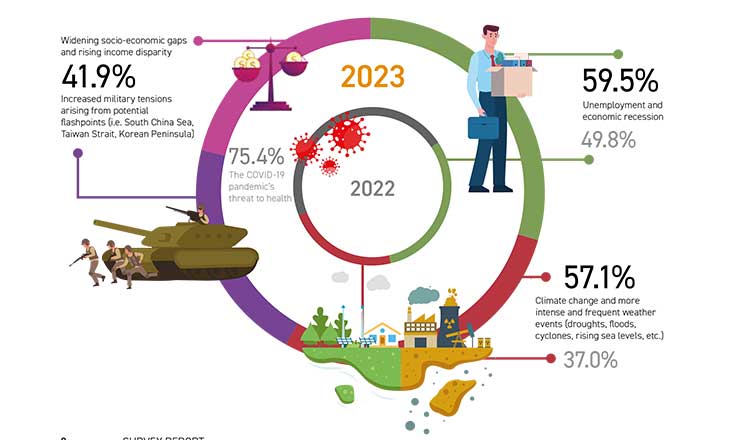Confidence in ASEAN’s leadership in free trade up at 23.5% in 2023
Amidst the turbulence in the world economy due to inflation, soaring energy prices, supply chain disruptions and the ongoing US-China competition, the challenges facing Southeast Asia are becoming increasingly complex with each passing year.
But the region’s confidence in ASEAN’s leadership in global free trade soared from 15.5 percent in 2022 to 23.5 percent in 2023, placing it in the top spot ahead of the US (21.9 percent) and the EU (17.6 percent).
Almost three years since Covid-19 was declared a global pandemic, Southeast Asia has moved beyond the health concerns of the pandemic to focus on socio-economic impacts that confront them, the effects of climate change, and evolving geopolitical tensions, says a recent State of Southeast Asia 2023 survey report.
The economic influence of the Association of Southeast Asian Nations (ASEAN) has doubled to 15 percent in 2023 from 7.6 percent in 2022, amidst the US-China trade tensions. A year after the Regional Comprehensive Economic Partnership (RCEP) Agreement entered into force, the perception of ASEAN’s economic standing has increased considerably across all Southeast Asian countries, especially Laos (with an increase of more than ten-fold), says the report.
According to the survey published on February 9 by the ASEAN Studies Centre at the ISEAS-Yusof Ishak Institute, major issues facing the region are unemployment and economic recession (59.5 percent), impacts of climate change (57.1 percent) and the widening of socio-economic gaps and rising income disparity as well as military tensions (tied at 41.9 percent).
Unemployment and recessionary concerns are particularly elevated in Indonesia at 70.2 percent, Cambodia at 69.4 percent and Malaysia at 63.7 percent.
Nearly three years after the start of the pandemic, the region began emerging from Covid-19’s shadow around the middle of 2022. Starting with Cambodia’s early lifting of restrictions in March 2022, almost all the countries in the region opened their borders to trade and travel by July 2022. By this time, public health concerns had eased with regional governments choosing to live with Covid-19.
The survey saw the participation of 1,308 people from 10 ASEAN member states, with Singapore leading the highest number of respondents at 208 (15.9 percent), followed by Thailand at 144 (11 percent) and Vietnam at 136 (10.4 percent).
Cambodia accounted for 10.2 percent participation, Malaysia (9.5 percent), Indonesia (9.3 percent), Brunei (9.2 percent), Myanmar (8.8 percent), Laos (8.2 percent), and the Philippines (7.6 percent).
Most respondents belonged to economically productive and well-informed age groups – 40.4 percent from 21-35 years, and 26.7 percent from 36-45 years – in Southeast Asia.
However, the survey points out that Southeast Asians remain most concerned about ASEAN being slow and ineffective, thus not being able to cope with political and economic developments (82.6 percent). They are also concerned that ASEAN is becoming an arena for major power competition in which its member states may become proxies of major powers (73 percent).
In the same vein, 60.7 percent are worried about ASEAN’s disunity. Fears that ASEAN is unable to recover from the pandemic are ranked last (37.2 percent).
Increased tensions in the Taiwan Strait and unresolved disputes with China are the biggest potential flashpoints affecting the region. Around 43.3 percent of the respondents fear that the outbreak of hostilities in the Taiwan Strait will destabilise the region. Some 28.7 percent feel that ASEAN countries will be forced to take sides while 15.5 percent feel that it will reduce economic cooperation with either China or Taiwan, says the ISEAS-Yusof Ishak Institute survey.
Only 3.4 percent of the respondents say that it will not affect the region at all, it added
China continues to be seen as the most influential economic (59.9 percent) and political-strategic (41.5 percent) power in the region. However, China’s growing influence is not well-received by the region. Around 64.5 percent of those who view China as the most influential economic power and 68.5 percent of those who see China as most influential in the political and strategic sphere express their concern about its expanding influence.
If ASEAN were forced to choose between the two major powers, two-thirds of respondents (61.1 percent) will cast their lot with the US. China as a choice dropped from 43 percent to 38.9 percent in 2023.
However, when the respondents are assessed by nationality, the majority of respondents from Brunei, Malaysia and Indonesia expressed their opinion in the favour of China over the US.
A large number of respondents were for the expansion of the ASEAN. Nearly two-thirds of the respondents (61.5 percent) support the accession of Timor-Leste to ASEAN. Only 15.8 percent disagree and 22.7 percent are not sure. Of those who approve, close to half (48.7 percent) believe that it will enhance ASEAN’s unity and centrality. One-third (34.4 percent) of those who disapprove feel that it will slow down ASEAN’s economic integration.
On global issues affecting world peace, the majority of respondents (82.9 percent) express their concern over the Russian invasion of Ukraine. Increase in energy and food prices (58.3 percent), erosion of trust in a rules-based order and violation of national sovereignty (25.9 percent), and increase in existing divisions within ASEAN (7.4 percent) are the most serious impacts on Southeast Asia.
As the US-China rivalry intensifies, the region’s confidence in the two major powers decreased significantly, while confidence in ASEAN and other middle powers increased. The entry into force of the RCEP agreement and the diversification of production sites from China to Southeast Asia may have resulted in greater confidence in ASEAN, says the survey.
The significant increase in support for ASEAN’s economic leadership comes from Indonesia, Laos, Malaysia, and Singapore. On the other hand, China saw a significant reduction in confidence from Cambodia and Laos, while the US experienced a considerable loss of confidence from Indonesia, Malaysia, Singapore, and Thailand despite launching the Indo-Pacific Economic Framework for Prosperity involving these countries.
Source: https://www.khmertimeskh.com/501237388/confidence-in-aseans-leadership-in-free-trade-up-at-23-5-in-2023/


 Thailand
Thailand




